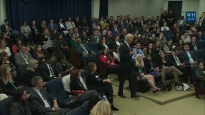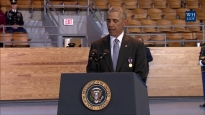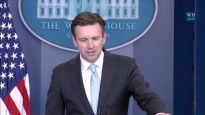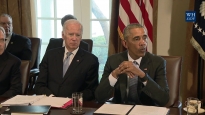The President's Remarks in Mexico City
April 16, 2009 | 6:05
President Obama gives remarks at a dinner with Mexican President Felipe Calderón after a day of meetings between the two nations. The dinner was held at the Museo Nacional de Antropologia in Mexico City on April 16, 2009. (public domain)
Download mp4 (63.6MB)
Remarks By President Obama At Dinner With President Calderon 4/16/2009
THE WHITE HOUSE
Office of the Press Secretary
Office of the Press Secretary
(Mexico City, Mexico)
--------------------------------------------------
For Immediate Release April 16, 2009
--------------------------------------------------
For Immediate Release April 16, 2009
REMARKS BY PRESIDENT BARACK OBAMA
AT DINNER
Museo Nacional de Antropologia
Mexico City, Mexico
AT DINNER
Museo Nacional de Antropologia
Mexico City, Mexico
8:17 P.M. CDT
PRESIDENT OBAMA: Good evening. Thank you very much. Let me begin by expressing my deepest thanks to President Calderón and Mrs. Zavala for their gracious welcome. And thank you for the spectacular setting. I can't imagine a more magnificent evening. This is my first trip as President to Mexico, and it's one that I will always remember fondly for the hospitality and the warmth that has been provided to me during my brief visit.
Now, earlier today, we conducted a series of productive meetings on a whole host of challenges and opportunities that we face jointly. We spoke about our deep economic ties, reflecting the $1 billion of trade that crosses our borders every day. And we discussed steps that we can take together, both bilaterally and in a global setting, to advance opportunity and prosperity in our two countries and across the Americas.
We spoke about the deep ties between our peoples, and what steps can be made to meet our immigration challenge. That involves passing comprehensive immigration reform in the United States, which I am committed to doing, and it involves making certain that we are promoting increased opportunity here in Mexico.
We spoke about our obligation to take steps to build clean energy together that can power our economies and beat back climate change in future centuries. And of course, we spoke about the grave dangers that the drug cartels are presenting to both our nations, that are threatening innocent men and women and children on both sides of our borders, and our shared determination to put an end to these drug wars.
These are some of the critical challenges that we face as a result of a border we share. But what makes us good neighbors is not that our interests are always aligned, that we will agree on everything -- in our long and interwoven history, we haven't always been on the same side of every issue, and there is no doubt that in the future there will be differences once again -- what makes us good neighbors is a simple truth -- that our people share so much more than common challenges and common interests. We also share values and ideals. We are both a people who know the meaning of hard work; a people who know what it means to struggle and to sacrifice on behalf of our children and our grandchildren; people who know that strength comes from faith and from family; people who have known hardship and trial and persevered in the face of great odds.
That's the story of the separate struggles for independence that have made our nations who we are -- struggles that are forged on this continent, two adjoining nations founded on a set of shared values; that our democracy is not simply a gift from a previous generation, but a responsibility for each generation to protect and to pass on to the next. We both understand that no one, whether through influence of politics, the power of money, or the fear of force, is above the law; and that we are, every one of us, equal, endowed with the basic human rights that spring not from our laws, but from our Maker.
Each of our nations was formed out of this sense that a state has no greater responsibility than to uphold the essential dignity of its citizens. That was the promise of my country's struggle for independence. That was the promise of Mexico's struggle for independence. That was the promise of American independence. It's a promise advanced by Hildago, as well as Washington; by Lincoln, but also by Juarez -- and a promise that now falls on all of us to advance in our own time.
More than 60 years ago, at a moment when our world was consumed with war, one of my predecessors came here to Mexico to reaffirm the relationship between our two nations. In a speech to the people of Mexico, Franklin Delano Roosevelt said, "[Our] peoples are finding that they have common aspirations. They can work together for a common objective. Let us never lose hold of that truth."
That was President Roosevelt's message then. That is my message now. And I'm confident that if we continue to draw strength from our common aspirations and purpose from our common objectives, if we continue to act, as we have during this visit, in a spirit of mutual responsibility, mutual respect, and mutual interest, then that is a truth that we will uphold together in the months and years to come.
And I am so pleased that I have such an outstanding partner as President Calderón, somebody who has shown his courage and his bravery, and somebody who's shown that he combines a sense of principle with a sense of practicality; somebody who I know wants to be a partner with me as we strengthen our partnership and we make certain that the children of Mexico and the children of the United States are both seeing a future that's more prosperous and more hopeful than the ones that have come before.
So, thank you very much, everybody. And let me please make a toast to my host. (Applause.)
(A toast is offered.)
END
8:22 P.M. CDT
8:22 P.M. CDT
###
|
January 6, 2017
|
January 6, 2017
|
January 5, 2017
|
January 5, 2017
|
|
January 4, 2017
|
January 4, 2017
|
January 4, 2017
|
January 4, 2017
|
- &lsaquo previous
- 1
- 2
- 3
- 4
- 5
- 6
- 7
- 8
- 9
- …
- next &rsaquo







